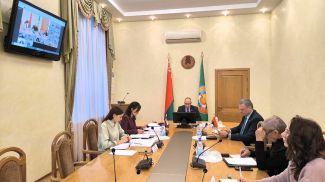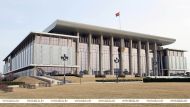MINSK, 23 April (BelTA) – The possibility of relaxing price controls is under consideration in Belarus. Belarusian Deputy Antimonopoly Regulation and Trade Minister Andrei Kartun made the relevant statement before a session of the Interstate Council for Antimonopoly Policy of the Commonwealth of Independent States (CIS), BelTA has learned.
The Council of Ministers' resolution No.100 of 23 February 2021 provides for stringent controls for prices for essential goods. As from 1 March prices for these goods cannot change by more than 0.2% of the price for these goods as of the last day of the previous month. “The growth of world prices for food is getting close to 25% year-on-year. We expected a much lower growth at the beginning of the year. Such growth rate has not been seen since 2014. Besides, there are restrictions on foreign trade shipments amid the pandemic. It has had a very strong effect on prices in Belarus. This is why we have to respond. But it important for us to accomplish another task: ensure the availability of essential goods in stores, particularly imports. For instance, we've decided to allow prices for sunflower oil to grow by 15% at most in order to preserve its availability. We have no problems with sunflower oil reserves at present,” the official said.
Andrei Kartun went on saying: “The government is now considering cancelling this Council of Ministers resolution and making the transition to more liberal measures. A session of the state pricing regulation commission under the Council of Ministers took place several days ago. This matter was discussed then. I think in the near future we will say when exactly this resolution will be cancelled. We will look for more relaxed mechanisms.”
When asked whether the cancellation of the resolution may entail a certain increase in prices, Andrei Kartun said: “We keep an eye on things. According to our estimates, there will be no substantial growth. We will closely monitor the retail industry to prevent abuses. We will either take pinpoint measures or there will be a transitional stage: we will replace strict price controls with more liberal ones, for instance, those affecting trade markups.”
The deputy antimonopoly regulation and trade minister also talked about the interaction of antimonopoly bodies of the CIS states during the pandemic. “We've been working in these conditions for more than a year. The focus of the work of antimonopoly bodies has shifted towards price regulation, the prevention of unjustified price hikes, and efforts to ensure the availability of food and other critical goods in retail, particularly imports. We have to strike a balance between supporting the private sector and ensuring rights of consumers. It is what we are going to discuss today. Certainly, competition incentives and control over the observance of antimonopoly legislation are also on the agenda. Uzbekistan will explain how it fights price collusion during auctions and tenders using digital technologies,” the official noted.
There are also plans to discuss the behavior of commercial entities that dominate markets or enjoy exclusive rights. “Some world producers abuse their patent rights and either raise prices on markets of our countries by several times or refuse to sell their products. Russia will share the experience of the so-called compulsory patent,” Andrei Kartun added.












